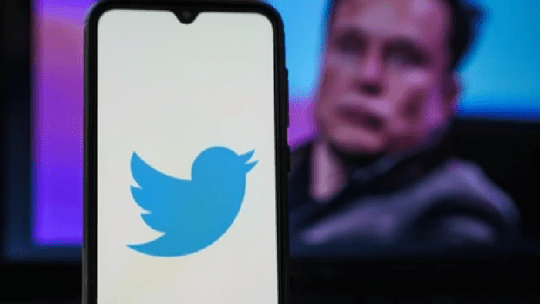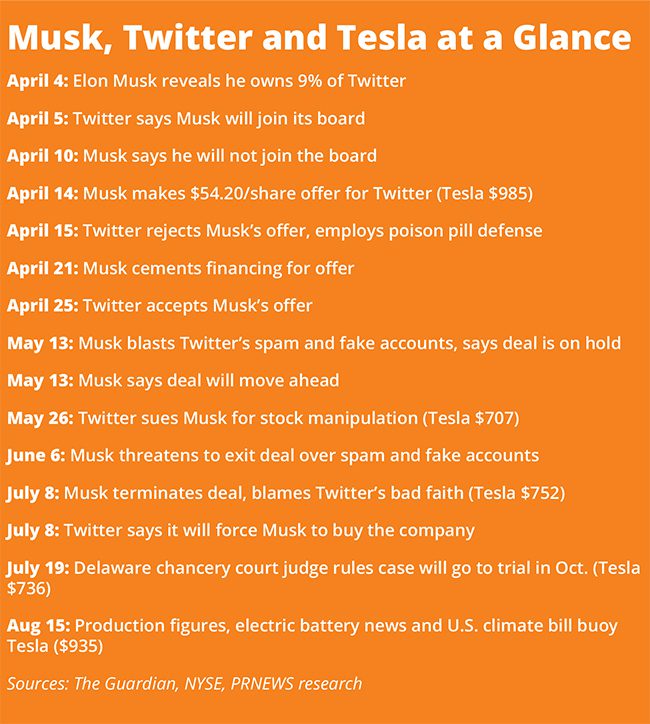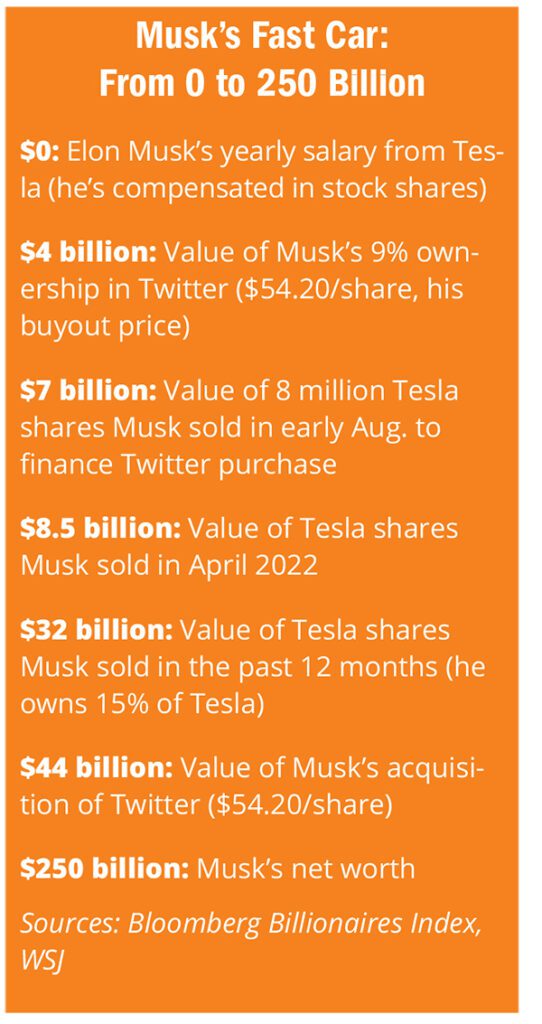
Loyal readers of this feature know its title, Crisis Averted, often needs a question mark behind it. Many events the media and public label PR crises are not. For example, they’re not existential threats, though they may dent a company’s reputation. Still, we use them as examples in these columns.
However, in this edition of Crisis Averted, we’ve picked examples where we admit a PR crisis hasn’t occurred.
Instead, they’re instances where something happened and the aftermath seems ripe for crisis. So, this month’s feature requires a question mark and could read: Have We Averted a Crisis?
The Long Dance
The first situation is the on-again off-again courtship dance of Twitter and Elon Musk. [For a quick recap, see chart].

While Musk began protesting the deal in mid-May, citing Twitter’s spam and fake accounts, an explanation for his reluctance possibly is more basic, the social platform company alleges.
The economy began inflating, and tech stocks, including Tesla, cooled. In early July, Musk’s net worth was off $100 billion.
High Offer Price
Moreover, the declining market for tech made Musk’s $54.20/share offer for Twitter seem anachronistic. Twitter’s shares were trading at $45 when Musk made his offer. In mid-July, they were in the mid-30s. The lower value made finding partners to join Musk in the Twitter venture more difficult.
In addition, the Twitter deal’s structure puts a lot of heat on Musk, who’s in the hole for $33 billion in equity. Not coincidentally, that’s the value of Tesla shares he’s sold this year.
In October, a five-day trial in Delaware likely will settle the back-and-forth. In short, Twitter hopes the court will rule Musk must purchase the company or pay a substantial penalty.
Still, there are embers remaining from the Musk-Twitter clash. Perhaps they could ignite before October into a full-blown PR crisis. Here are the concerns:
As if forcing a reluctant future owner to purchase Twitter isn’t bad enough for company morale, the billionaire, whose every utterance becomes news, lately has said repeatedly he doesn’t want to own the social platform.
Indeed, when he sold nearly $7 billion in Tesla shares earlier this month, Musk tweeted he was doing so “in the (hopefully unlikely) event that Twitter forces this deal to close and some equity partners don’t come through, it is important to avoid an emergency sale of Tesla stock.”
In addition to the cloud hanging over Twitter, Tesla investors are antsy.
They’re concerned Musk’s Twitter activities cast a dark shadow over Tesla. From a financial viewpoint, they’re worried about Musk looting Tesla so he can buy Twitter. Similarly, they’re worried Twitter diverts Musk’s attention and energy from overseeing the car maker.
Who wants to work at a company or partner with one whose owner doesn’t want to be there?
So, could these issues lead to a PR crisis? For Andrew Duffy, founder/CEO, SparkPlug, a labor consulting firm, Twitter’s been in “crisis mode” for years. “Twitter has had a huge mismatch between the degree of influence it has on culture, which is substantial, and its ability to monetize it.”
A Good Situation for Twitter
Yet Duffy feels Musk offers Twitter a narrative-changing moment. Twitter appears like “the little guy fighting against a billionaire,” he says. Duffy admits this “is crazy, since you’re talking about a multi-billion-dollar company, but somehow that’s the position that they’re in.”
More than that, he’s not worried about Twitter employees jumping ship as the company’s future is unsettled.
“Look at their competitors for talent, like Google. These companies are starting to either freeze hiring, slow hiring or signal that they’re going to be laying people off… making cuts to their workforce.”
The labor market will get looser, which means “there’s going to be more people on offer, and there’s going to be fewer places that are going to scoop up the workers from [those] who leave Twitter immediately.”
And so, Duffy concludes, Twitter is in a strong position. Potentially it will get billions from Musk’s penalty or his purchase offer, which is “outlandishly higher than the current value of the company.”
Moreover, he says Twitter has Musk “on the ropes…Nobody’s been able to do that, including rival car makers or the SEC…So, this whole thing might be a crisis averted” for Twitter.
Indeed, Duffy feels the dents in Musk’s reputation over Twitter are more a crisis for the billionaire and Tesla. He reasons Musk’s bullet-proof personality bolster Tesla’s share price and talent recruiting efforts more than its cars or trucks. As such, with things seemingly catching up with Musk, Tesla shares faltered (see chart).
While he doesn’t believe the public is overly concerned with Musk vs. Twitter, “it’s way above our heads...,he’s a billionaire and Twitter’s a multi-million-dollar company,” says Mark Yontz, director, Wixted & Company, who is concerned with internal communication.
Specifically, what is Twitter communicating to employees and other stakeholders? “If I knew that, I could say whether this is a crisis averted or a slowly gathering tsunami.”
Internal Communication?
He notes, correctly, internal communication often is overlooked, particularly during a crisis. “You can’t control what is said about your company externally, but you have much more control over internal communication,” he says.
Moreover, he adds, Twitter “painted itself into a corner” internal-communication-wise when initially it rejected Musk’s purchase offer April 15 (see chart). “I can imagine some frontline workers are appalled over the change in direction.”
Now, he says, the best route for internal communicators is transparency.
“Tell employees ‘we initially thought rejecting the offer was in the company’s best interests. We were wrong. Now we understand the best path for stability and moving the company forward is a purchase or penalty.’”
Chipotle and its NYC workers
Our experts are much more aligned about the crisis potential in the next example.
This little-known item starts with an Aug. 9 announcement that 13,000 NYC current and former Chipotle employees are eligible for compensation after the company settled a grievance for $20 million with the city’s Department of Consumer and Worker Protection.
In addition, Chipotle will pay $1 million in civil penalties, mayor Eric Adams said.
It’s the largest worker protection settlement in New York City history, Adams added. He credited a unit of SEIU (Service Employees International Union) for “helping uncover these violations.”
In short, 160 workers complained that the burrito maker failed to provide predictable schedules in a timely fashion.
Moreover, they were denied paid sick leave under the Fair Workweek and Paid Safe and Sick Leave laws. The violations occurred from November 2017 through April 2022.
Crisis observers might recall that Chipotle’s lack of paid sick leave was uncovered during the company’s PR crisis, as E.coli spread through some of its restaurants, beginning in late 2015.
In concert with the mayor’s announcement, Chipotle’s chief restaurant officer Scott Boatwright issued a statement that underwhelmed observers. You’ll note it lacks empathy or an apologetic tone. The full text follows:
Chipotle’s Robotic Statement
“We’re pleased to be able to resolve these issues and believe this settlement demonstrates Chipotle’s commitment to providing opportunities for all of our team members while also complying with the Fair Workweek law.
We have implemented a number of compliance initiatives, including additional management resources and adding new and improved time-keeping technology, to help our restaurants and we look forward to continuing to promote the goals of predictable scheduling and access to work hours for those who want them.”
Admit nothing
Both Duffy and Yontz agree the statement is a lawyer’s delight: brief, mechanical and admitting no guilt. Similarly, “they’re trying to make as boring a statement as possible,” Duffy says. “The last thing they want is something that brings more media coverage.”
Yontz agrees that “legal likely was behind this.” He also believes “this likely is the culmination of a lengthy dispute and bargaining situation. And in these situations, you’ve already communicated with your stakeholders and alerted them something like this is coming.”
What’s Next?
Both our experts noted the importance of the settlement for NY workers, but also speculated about its larger implications.
Yontz believes that it means little externally. “The average customer doesn’t know about it and worries about his burrito bowl.” So, as long as nothing else pops up, it’s crisis averted.
On the other hand, he wonders what operations issues led to the problems in New York. Are they endemic to Chipotle’s accounting system nationwide? If so, “you have to be worried if you’re a Chipotle executive,” he says.
Similarly, will scheduling complaints appear at other restaurants in Chipotle’s nationwide chain?
“Are groups in other states looking for infractions? They need to keep an eye on this…pay attention to this before they can say ‘all clear.’ If something like this pops up again, all bets are off.”
Duffy sees the incident in the context of larger labor issues permeating U.S. industry.
This incident likely is “terrifying to the corporate offices of Chipotle…and every single operator that has a huge workforce of hourly workers, like McDonald’s , Starbucks and others. It means it probably is going to inspire people to take a hard look at their jobs and determine whether they are being treated fairly under the law...so we’ve not averted a crisis.”
Labor’s New Power
He adds that laborers have more power because of the worker shortage and the public’s belief changing about the value of frontline work and the dignity of workers.
In this inflationary condition, he says, it’s hard to imagine being able to pay for your life on minimum wage. “And it means that these groups are going to be much more empowered, rightfully, to fight for what they want...they’ll see they can win when they put up a united front against things that are not right.”
Escape Hatch
“[E]very single corporate player is looking for the escape-hatch option, because what they don’t want to admit is…the only way to demonstrate that you ‘care’ about your workers is to pay them more money.”
If employers can’t demonstrate they are valuing people, “then they will never be taken seriously by workers...or the public in general, when they’re looking at the clear dichotomy in the economic situation between the owners of businesses and the workers they are employing.”
For Duffy, “the only answer is for a truly visionary, forward-thinking leader at one of these companies to put forward, sooner rather than later,” a higher, living wage for hourly workers.
“Say you’ve come out and made it clear that you are the company that cares about workers. You will get the goodwill benefit from that sort of first mover advantage that might actually save you money down the line.”
